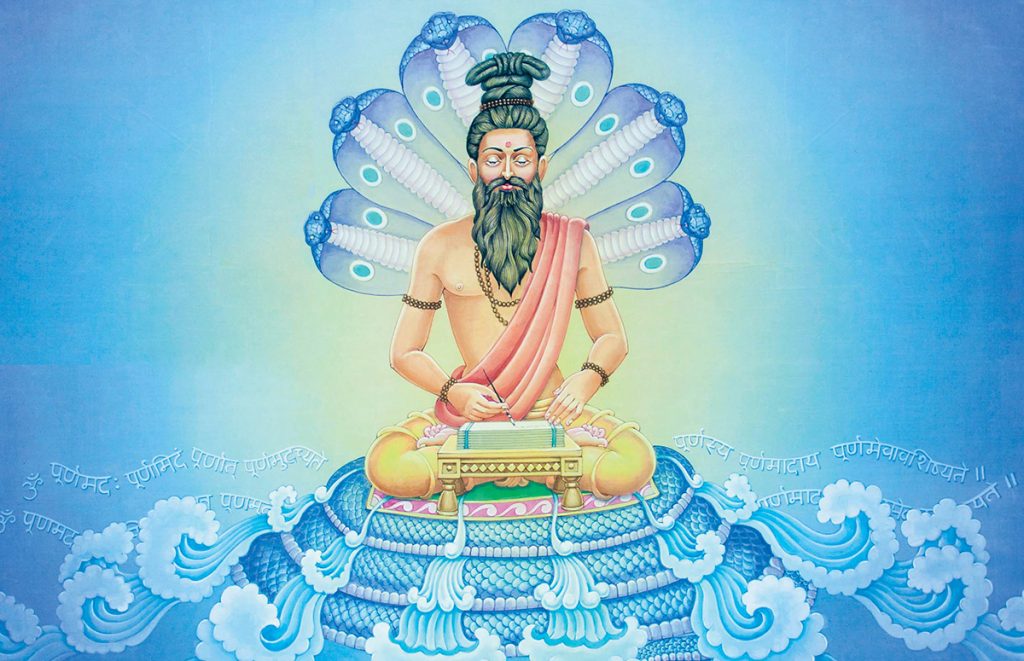“And that is why I said”, concluded Damanaka, “that sometimes we have ourselves to blame for our misfortunes, much like in the case of the jackal, the monk and the messenger-girl.
Karataka nodded his head. “So what should we do now, in this situation?”

Damanaka replied -“Even in this difficult situation, my intelligence is intact… I will break their friendship. It is said…
एकं हन्यान् न वा हन्याद् इषुः क्षिप्तो धनुष्मता ।
प्राज्ञेन तु मतिः क्षिप्ता हन्याद् गर्भ-गतान् अपि ॥ २१५ ॥
ekaṃ hanyān na vā hanyād iṣuḥ kṣipto dhanuṣmatā |
prājñena tu matiḥ kṣiptā hanyād garbha-gatān api || 215 ||
An arrow released from the bow of an archer may kill one person at best, and may even miss it’s target. But an intelligent move by an expert strategist can not only destroy a king, but can also destroy his whole country.
“And so, using secret methods of conspiracy, I will create a rift between Sanjeevaka and Pingalaka.”
Karataka replied in a cautious tone ” Damanaka, if either one of them get to know of your plan, they will kill you or sure…be careful.”
“Don’t think of it this way”, said Damanaka. “An expert politician should use his intelligence and deploy his strategies even in dangerous situations, and even when there seems no way out. It may just happen to work, sometimes unexpectedly, due to घुणाक्षर न्याय (Gunākshara Nyāya), a quirk of fate!”
घुणाक्षर न्याय (Gunākshara Nyāya) – The maxim of the letters made by the wood worm, Ghuna. This worm bores holes in wood and in books which sometimes assume the shape of a letter; hence it is used to denote the occurrence of something quite accidental, or a chance occurrence. Chakrapani in Deerghamjeeviteeyam Adhyaya refers this Nyaya while explaining the Samyagyukta Bheshaja Lakshana. Bheshaja when properly used gives Arogya. A physician who is Jnaanavan can only do the proper Yojana of the Bheshaja. One who attains good results without proper Jnāna is by Yadrucchaa, that is, by chance. It is like Ghunaakshara – the worm accidentally causing an Akshara. This highlights the requirement of Jnāna for Samyagyojana of Bheshaja and the Siddhi of Chikitsaa.
Damanaka continued – “It is said…”
त्याज्यं न धैर्यं विधुरेऽपि दैवे धैर्यात् कदाचित् स्थित्म् आप्नुयात् सः ।
याते समुद्रेऽपि हि पोत-भङ्गे सांयात्रिको वाञ्छति कर्म एव ॥ २१६ ॥
tyājyaṃ na dhairyaṃ vidhure’pi daive dhairyāt kadācit sthitm āpnuyāt saḥ |
yāte samudre’pi hi pota-bhaṅge sāṃyātriko vāñchati karma eva || 216 ||
Man should not lose courage in dire circumstances, and even when fate seems to go against him, because, it is only through courage that man stands a chance to overcome an adverse situation. A seafarer tries his best to reach land, even when his ship breaks down in the middle of the vast ocean.
And also…
उद्योगिनं सततम् अत्र समेति लक्ष्मीर् दैवं हि दैवम् इति कापुरुषा वदन्ति ।
दैवं निहत्य कुरु पौरुषम् आत्म-शक्त्या यत्ने कृते यदि न सिध्यति को ऽत्र दोषः ॥ २१७ ॥
udyoginaṃ satatam atra sameti lakṣmīr daivaṃ hi daivam iti kāpuruṣā vadanti |
daivaṃ nihatya kuru pauruṣam ātma-śaktyā yatne kṛte yadi na sidhyati ko ‘tra doṣaḥ || 217 ||
Prosperity favours only the brave. You will only get what is in your fate – so say the cowardly. That is why man should not depend on fate, he should work by the strength of his own willpower. If you do your best, but still do not get the result, it is not your fault, and you are not to blame.
“And so, I will conspire to break their friendship, but carefully, and in a way that they would not even come to know of it. Remember, even God helps those who work hard and put in their best efforts. It is said…”
सुप्रयुक्तस्य दम्भस्य ब्रह्माप्य् अन्तं न गच्छति ।
कौलिको विष्णु-रूपेण राज-कन्यां निषेवते ॥ २१८ ॥
suprayuktasya dambhasya brahmāpy antaṃ na gacchati |
kauliko viṣṇu-rūpeṇa rāja-kanyāṃ niṣevate || 218 ||
The secret of a well-thought-of conspiracy is not even known to the Gods. It is due to his well-hatched plan that the weaver enjoyed the company of the princess, in the form of Vishnu.
Karataka was curious. “How did that happen?”
Damanaka replied…
to be continued…

Pingback: The weaver and the princess.. – Shihan Rohit Ghai